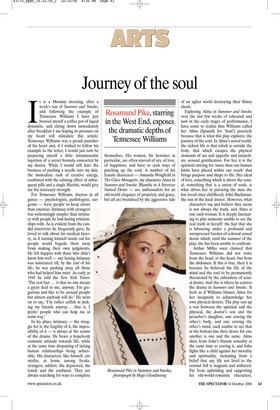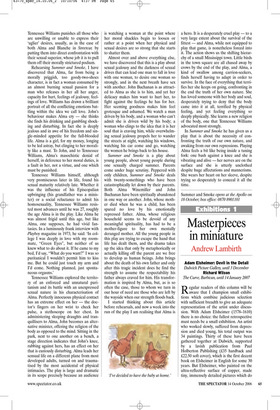Journey of the soul
Rosamund Pike, starring in the West End, exposes the dramatic depths of Tennessee Williams
It is a Monday morning, after a week’s run of Summer and Smoke, and following the example of Tennessee Williams I have just brewed myself a coffee pot of liquid dynamite, and sitting down immediately after breakfast I am hoping its pressure on my heart will stimulate this article. Tennessee Williams was a proud punisher of his heart and, if I wished to follow his example to the letter, I would just now be preparing myself a little intramuscular injection of a secret formula concocted by my doctor. While I would still hate the business of pushing a needle into my skin, the immediate rush of creative energy, combined with the calming effect of subsequent pills and a single Martini, would give me the necessary strength.
For Tennessee Williams, doctors in all guises — psychologists, pathologists, surgeons — were people to keep closer than enemies. Intimacy with strangers was welcomingly simpler than intimacy with people he had lasting relationships with. As is evident from the candid interviews he frequently gave, he loved to talk about his medical history, as if turning himself inside out for people would beguile them away from making their own judgments. He felt happier with those who didn’t know him well — any lasting intimacy was mistrusted till, by the end of his life, he was pushing away all those who had helped him most. As early as 1945 he told the New York Times: ‘The real fact ... is that no one means a great deal to me, anyway. I’m gregarious and like to be around people but almost anybody will do.’ He went on to say, ‘I’m rather selfish in picking my friends anyway ... that is, I prefer people who can help me in some way.’ In his plays, intimacy — the struggle for it, the fragility of it, the impossibility of it — is always at the centre of the drama. He bears a hopelessly romantic attitude towards life, while at the same time despairing of lasting human relationships being achievable. His characters, like himself, are misfits, at home among freaks, strangers, addicts, the depressed, the lonely and the confused. They are always searching for ways to complete themselves. His women, his heroines in particular, are often starved of sex, of love, of happiness, and have to seek ways of patching up the void. A number of his female characters — Amanda Wingfield in The Glass Menagerie, my character Alma in Summer and Smoke, Blanche in A Streetcar Named Desire — are ambassadors for an old-world elegance of propriety and grace, but all are brutalised by the aggressive tide of an uglier world destroying their flimsy ideals.
Exploring Alma in Summer and Smoke over the last few weeks of rehearsal and now in the early stages of performance, I have come to realise that Williams called her Alma (Spanish for ‘Soul’) precisely because that is what this play explores: the journey of the soul. In Alma’s moral world, the richest life is that which is outside the body, that which escapes the physical demands of sex and appetite and immediate sensual gratification. For her it is the spiritual striving for ‘more than our human limits have placed within our reach’ that brings purpose and shape to life. Her ideal of love, something which is above the sexual, something that is a union of souls, is what drives her in pursuing the man she has loved since childhood, John Buchanan, the son of the local doctor. However, what characters say and believe they mean is not always the truth, and Alma is one such woman. It is deeply fascinating to play someone unable to see the real truth in herself: the fact that she is labouring under a profound and unexpressed burden of colossal sexual desire which, until the summer of the play, she has been unable to confront.
Arthur Miller once claimed that Tennessee Williams did not write from the head, or the heart, but from the abdomen. If this is true, then it is because he believed the life of the mind and the soul to be permanently threatened by the subculture of sexual desire. And this is where he centres the drama in Summer and Smoke. It feels as if Williams blames Alma for her incapacity to acknowledge her own physical desires. The play sets up a war between the spiritual and the physical, the doctor’s son and the preacher’s daughter, one craving the other’s body, and one craving the other’s mind, each unable to see that at the bottom line their desire for one another is one and the same. Alma shies from John’s blatant sexuality at the same time as craving it, and John fights like a child against her morality and spirituality, stemming from a belief that any life not lived to the sensual full is stagnant and withered. Far from upholding and supporting his old-world-romantic characters, Tennessee Williams punishes all those who are unwilling or unable to express their ‘uglier’ desires, usually, as in the case of both Alma and Blanche in Streetcar, by putting them into direct confrontation with their sexual superior, whose job it is to pull them off their morally strictured podium.
Rehearsing Summer and Smoke, I have discovered that Alma, far from being a morally priggish, too goody-two-shoes character, is in fact a woman consumed by an almost burning sexual passion for a man who releases in her all her anger, capacity for hurt, feelings of jealousy, feelings of love. Williams has drawn a brilliant portrait of all the conflicting emotions battling within the idea we call love. John’s behaviour makes Alma cry — she thinks she finds his drinking and gambling shocking and disturbing. In fact she is deeply jealous and in awe of his freedom and single-minded appetite for the full-blooded life. Alma is a girl, for my money, longing to be led astray, but clinging to her morality like a mast. To John, and to Tennessee Williams, Alma’s masochistic denial of herself, in deference to her moral duties, is a fault in her, not a virtue, and one which must be punished.
Tennessee Williams himself, although very promiscuous later in life, found his sexual maturity relatively late. Whether it was the influence of his Episcopalian upbringing (his grandfather was a minister) or a social reluctance to admit his homosexuality, Tennessee Williams resisted most advances until he was 27, roughly the age Alma is in the play. Like Alma he was almost frigid until this age, but like Alma, one supposes, he had vivid fantasies. In a luminously frank interview with Playboy magazine in 1973, he said: ‘In college I was deeply in love with my roommate, “Green Eyes”, but neither of us knew what to do about it. If he came to my bed, I’d say, “What do you want?” I was so puritanical I wouldn’t permit him to kiss me. But he could just touch my arm and I’d come. Nothing planned, just spontaneous orgasms.’ Tennessee Williams explored the territory of an enforced and unnatural puritanism and its battle with an unexpressed sexual nature in his characterisation of Alma. Perfectly innocuous physical contact has an extreme effect on her — the doctor’s fingers on her wrist to check her pulse, a stethoscope on her chest. In administering sleeping draughts and tranquillisers to Alma, John becomes an alternative minister, offering the religion of the body as opposed to the mind. Sitting in the park, next to one another on a bench, a stage direction indicates that John’s knee, rubbing against hers, has an effect on her that is curiously disturbing. Alma leads her sensual life on a different plane from most developed adults, turned on and traumatised by the most accidental of physical intimacies. The play is large and dramatic in its scope precisely because an audience is watching a woman at the point where her moral shackles begin to loosen or rather at a point when her physical and sexual desires are so strong that she starts to shatter them.
Almost over and above everything else, we have discovered that this is a play about sexual jealousy and the darkness of sexual drives that can lead one man to fall in love with one woman, to desire one woman so strongly, and in the next breath have sex with another. John Buchanan is as attracted to Alma as she is to him, and yet her delicacy makes him want to hurt her, to fight against the feelings he has for her. Her seeming goodness makes him feel grotesque and ashamed. We watch a man driven by his body, and a woman who can’t admit she is driven wild by his body; a woman who clings to the idea that it is her soul that is craving him, while overwhelming sexual jealousy propels her to wander the streets at night, watching his windows, watching his car come and go, watching the women he brings back to his house.
Summer and Smoke is a play about young people, about young people during one sexually charged summer. Parents come under huge scrutiny. Peppered with only children, Summer and Smoke deals with twenty-somethings who have been catastrophically let down by their parents. Both Alma Winemiller and John Buchanan have been spiritually abandoned in one way or another. John, whose mother died when he was a child, has been spared no love by his emotionally repressed father. Alma, whose religious household seems to be devoid of any meaningful spirituality, has had to be a mother-figure to her own mentally deranged mother. All the young people in this play are trying to escape the hand that life has dealt them, and the drama takes up the idea that only by metaphorically or actually killing off the parent are we free to develop as human beings. John brings about the death of his own father and only after this tragic incident does he find the strength to assume the respectability his father always craved for him. His transformation is inspired by Alma, but, as is so often the case, those to whom we turn in our hour of need are those who are left by the wayside when our strength floods back.
I started thinking about this article before rehearsals, and now a week into the run of the play I am realising that Alma is a hero. It is a desperately cruel play — to a very large extent about the survival of the fittest — and Alma, while not equipped to play that game, is nonetheless forced into it. The action shows us the shifting hierarchy of a small Mississippi town. Little birds in the town square are all chased away by crows by the end of the play, and Alma, a kind of swallow among carrion-seekers, finds herself having to adapt in order to survive. In the face of everything that terrifies her she keeps on going, confronting in the end the truth of her own nature. She has loved someone with her body and soul, desperately trying to deny that the body came into it at all, terrified by physical feeling, and yet feeling everything so deeply physically. She learns a new religion of the body, one that Tennessee Williams advocated most strongly.
In Summer and Smoke he has given us a play that is about the necessity of confronting the truth of our own nature, and awaking from our own repressions. Playing Alma feels a bit like being inside a tuning fork: one bash against a knee and she is vibrating and alive — her nerves are on the surface and she is utterly unclothed despite huge affectations and mannerisms. She wears her heart on her sleeve, despite trying so desperately to conceal it all the time.



































































































 Previous page
Previous page